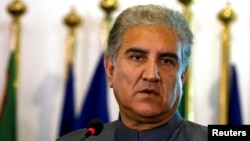Pakistan has held a fresh round of discussions with staunch ally China on the "evolving political dynamics in Afghanistan" amid reports the United States plans to reduce its military presence in the war-ravaged country.
Officials said Pakistani Foreign Minister Shah Mahmood Qureshi traveled to Beijing Tuesday for day-long discussions with Chinese counterpart, Wang Yi, and both sides underscored support for an "Afghan-led and Afghan-owned peace process."
Last week Pakistan organized what officials said were substantial talks between U.S. and Afghan Taliban representatives in the United Arab Emirates. The two sides are expected to meet again soon in the Gulf nation's capital, Abu Dhabi, to further the dialogue amid hopes the insurgent group would agree to engage in direct peace negotiations with the Afghan government.
'New developments'
After his meeting with his Chinese counterpart, Qureshi told Pakistani state television that "new developments" in Afghanistan and recent peace talks in Abu Dhabi came under discussion. He said China appreciated Islamabad's initiative for Afghan peace.
"They [the Chinese] have assured us of their full support for the efforts Pakistan is making for peace and stability in Afghanistan. They appreciated the progress achieved [in Abu Dhabi] in terms of discussing all matters on the negotiating table, including [an Afghan] cease-fire," said Qureshi. He did not elaborate.
The Pakistani foreign minister traveled to Afghanistan and Iran before visiting China as part of a "regional outreach" to push Afghan peace efforts. Qureshi is on a four-nation trip, with a last destination of Moscow where he will interact with Russian leaders.
"Both sides believe that military means cannot resolve the Afghanistan issue, and promoting political reconciliation is the only realistic way," Chinese Foreign Ministry spokeswoman Hua Chunying said after the talks.
Drawdown of U.S. troops
Pakistani Foreign Minister Qureshi's visit comes after reports quoted officials in Washington last week that U.S. President Donald Trump has verbally ordered the Pentagon to remove half of the 14,000 American troops in Afghanistan starting next month. The White House and military commanders have not commented on the reports.
The drawdown plans have fueled concerns and speculation that an abrupt withdrawal would bring embattled Afghan security forces under increased battlefield pressure from the Taliban and the move could undermine renewed peace efforts.
China has intensified regional diplomatic efforts to help ease Afghanistan's political tensions with Pakistan to encourage the two countries to work together to find a negotiated end to the Afghan war. Beijing enjoys good will in Kabul and it maintains contact with the Taliban.
Chinese Foreign Minister Wang launched a trilateral mechanism last year, involving its close ally, Pakistan, and Afghanistan to promote peace and regional stability. The platform is aimed at promoting security and economic and political cooperation among the three neighboring countries.
The latest round of the three-way foreign minister-level dialogue took place earlier this month were Wang pledged to help Islamabad and Kabul reduce trust deficit and make joint efforts for peace.
Beijing is worried that continued instability in Afghanistan would fuel troubles in the western Chinese region of Xinjiang, home to the Muslim Uighur ethnic group.
Chinese authorities blame extremists linked to the outlawed East Turkistan Islamic Movement, which claims to be fighting for rights of the Uighur community, for plotting terrorist attacks in Xinjiang and elsewhere in China.




